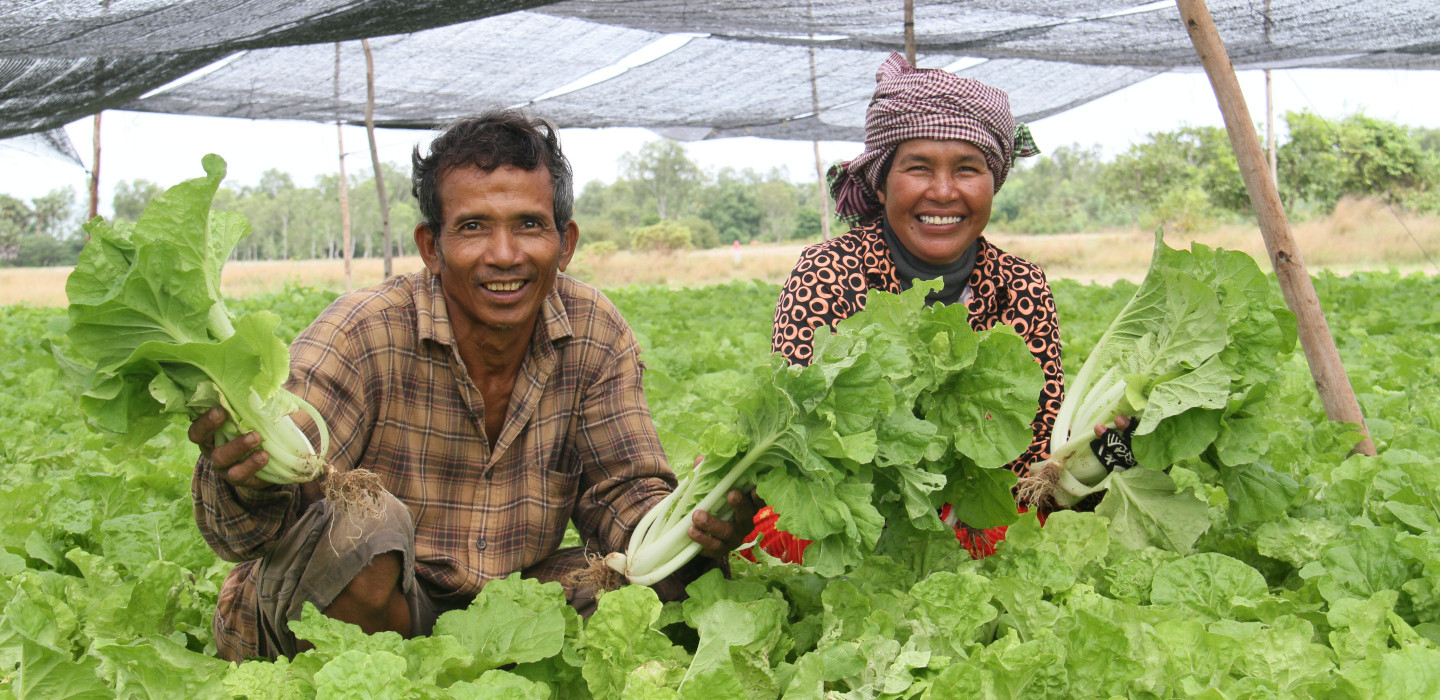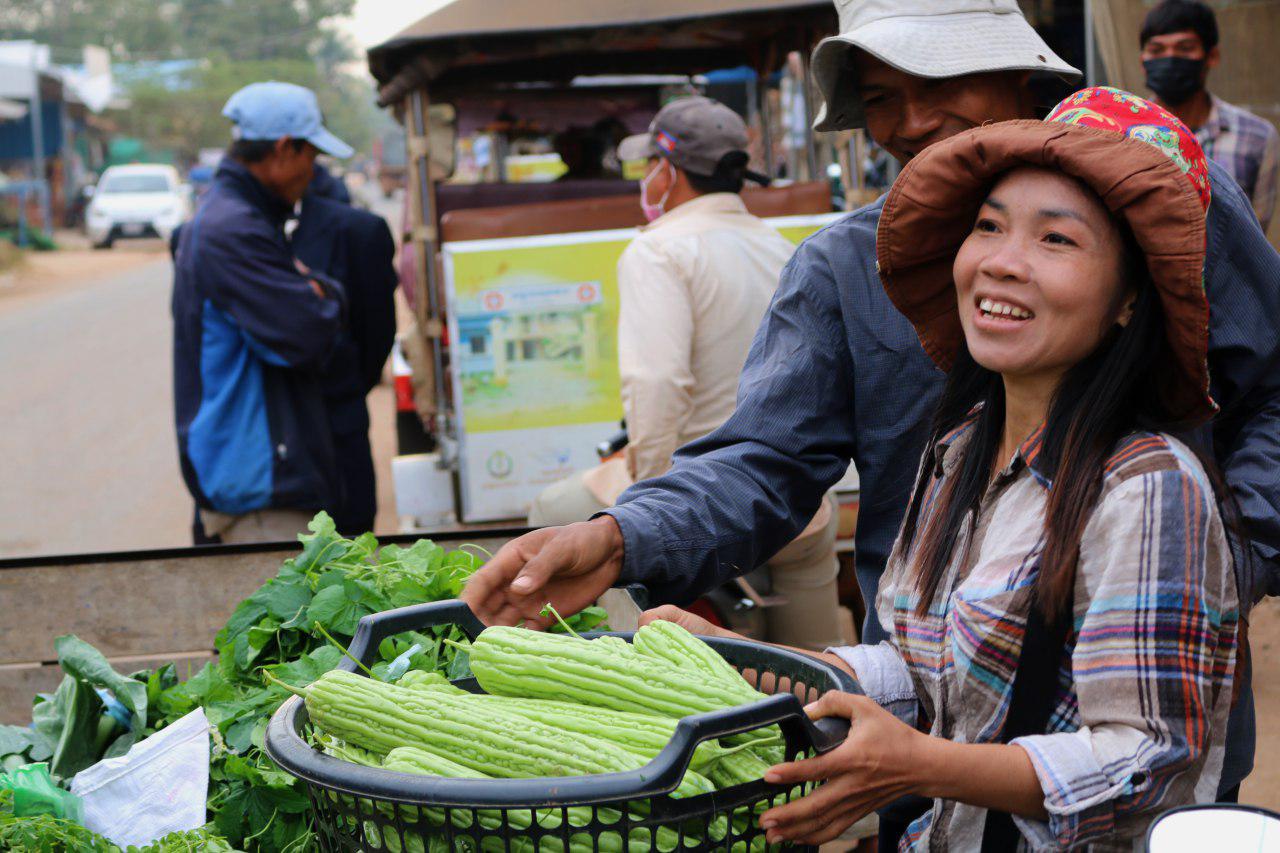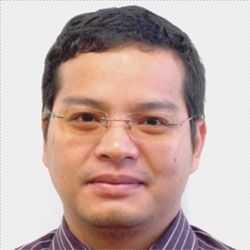Never let a good crisis go to waste
IFAD Asset Request Portlet
Publicador de contenidos
Nunca dejes pasar una buena crisis
Por Kaushik Barua, Sakphouseth Meng
 ©Lotus Radio
©Lotus Radio
El Sr. y la Sra. Un Mei, beneficiarios del proyecto ASPIRE, apoyado por el FIDA, trabajan en su campo de hortalizas en la provincia de Kandal, Camboya.
En Camboya, los pequeños agricultores se enfrentan a múltiples retos. A menudo no cuentan con acceso al crédito para mejorar la producción o invertir en equipo o infraestructura agrícola; y son cada vez más vulnerables al cambio climático.
Próximamente en español.
Farmers also need enhanced skills and technologies to be able to access up-to-date information, extension services, credit and markets. Another area which needs improvement is the rural road network to ensure that smallholders have an affordable way to access markets and services despite weather conditions.
Over the last two decades, Cambodia has made remarkable progress, growing at an average of 7.7 per cent during this period. This has also been accompanied by sustained poverty reduction. Agriculture has been a key pillar of this economic success: contributing through poverty reduction, income generation and enhanced food production.
However, as in many countries, there has been a decline in growth of the sector, and its share in GDP dropped from 34.6 per cent in 2011 to around 23.6 per cent in 2017. While the earlier period of growth depended on improving and expanding production, in the next stage we will have to focus on: developing new skills to further increase labour productivity; applying new technologies to improve land productivity; modernising infrastructure to improve the effectiveness of agricultural value chains.
How do we know we are on the right track? Through our previous projects, that have been independently evaluated, IFAD projects have contributed to increased production, ownership of assets and income for small farmers. For instance, through the Project for Agricultural Development and Economic Empowerment (PADEE) project, about 50,000 households who participated in project activities increased their incomes by over 100 per cent and their household assets by 79 per cent. Such increases in incomes (along with enhanced skills and access to services) allow rural families to enjoy healthier, more prosperous lives and contribute to Cambodia’s economic growth. Eighty per cent of the group revolving fund is still functioning after three years of the project completion date. Our current interventions build on the successes and the lessons from PADEE. For instance, our current work on digital technologies focuses on the sustainability of the private sector led app (a lesson from our previous work).
Unfortunately, we risk falling back due to the economic effects of the COVID-19 pandemic. The current pain points are: dampened global markets and therefore lower demand for exports; severe effects on the tourism and hospitality sectors due to global travel restrictions; and increasing pressures on international supply chains. There is already significant impact in the SME sector and in the garment sector. Due to these developments, many rural youth have lost their employment and are moving back home to their villages.

Kong Savorn and Ms Samnang sell their vegetables on the street using her tuk-tuk, she receives support from the IFAD-supported ASPIRE project, Kampong Chnang Province. (©ASPIRE)
With regard to the agriculture sector, while availability of rice is not a concern, there have been disruptions to the vegetable and livestock supply chains. Demand for vegetables and livestock products has dropped with the disruptions in tourism and hospitality sectors. Food security, especially physical and economic access to food, is also a potential concern. Further, due to the effects on unemployment, many returnees are in rural areas and need to be provided livelihood opportunities.
IFAD is aligning its response with Ministry partners, with the UN’s overall COVID-19 response (which covers both the health response and the socio-economic recovery), and with partners such as the Asian Development Bank. To address the economic distress and prevent food security stresses, IFAD and Ministry partners are focusing on: addressing the immediate economic needs of rural communities and creating opportunities for migrant returnees and youth who might have lost opportunities in the garment or tourism sector; and expanding prospects for smallholder farmers through enhanced production support and through focusing on the appropriate value chains and commodities to ensure adequate food production and dietary diversity.
Technology is and will continue to be a key requirement for boosting agri-businesses. Processing technologies are needed all along the supply chain to ensure value added. As we move forward, agricultural value chains will depend more and more on digital technologies. IFAD along with MAFF is developing tools to ensure extension services are delivered through online and tele-based services, including Skype calls, SMSs and phone calls. Digital tools are being developed in rapid time, including an interactive map tracing beneficiary households, as well as farmer diaries that can be updated online.
IFAD is partnering with Cambodia’s Rural Development Bank and the Ministry of Commerce to develop loan products for small farmers. The Ministry of Commerce (MOC) through the Accelerating Inclusive Markets for Smallholders (AIMS) is currently implementing a customized credit assessment to understand the specific needs of smallholders and value chain actors in selected supply chains. AIMS is also preparing to provide much needed on-farm support.
Along with the Ministry of Agriculture, Forestry and Fisheries (MAFF) and the IFAD-supported Agricultural Services Programme for Innovation, Resilience and Extension (ASPIRE) project, we are developing digital technologies to help small-scale producers access information extension service and markets virtually, including a recently developed app named Chamka that is being rolled out.
Both ongoing projects AIMS and ASPRE were rapidly reoriented with support from IFAD and the highest levels of the Government to address the COVID-19 pandemic. With the Ministry of Economy and Finance, we are developing the Khmer Agri Suites platform to create a range of digital tools and to host useful back-end data. With the Ministry of Rural Development, we are upgrading the rural road network and value chain infrastructure including ferry landing points and rural markets. Along with our Ministry partners and rural communities, we are developing a holistic programmatic approach to improve agricultural productivity, providing infrastructure, on-farm technical services, credit as well as new skills and technologies.
The entire country programme, and in particular AIMS and ASPIRE have significantly scaled up their plans to address the COVID-19 pandemic. As the international order recovered from WW II and the discussions around forming the United Nations picked up pace, Winston Churchill famously remarked: “Never let a good crisis go to waste.”
In Cambodia, while the immediate effect of the pandemic will be significant, the region is expected to make a sharp recovery, outpacing most others. IFAD and its partners are already preparing with a set of scaled up, modernized interventions.
Download presentations to find out more about our three-year digital adoption plan and digital solutions.
Excerpts originally published in the Khmer Times.
Fecha de publicación: 18 junio 2020
